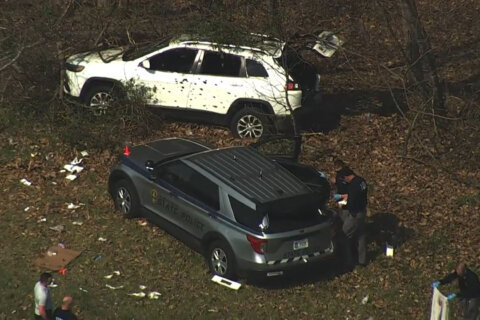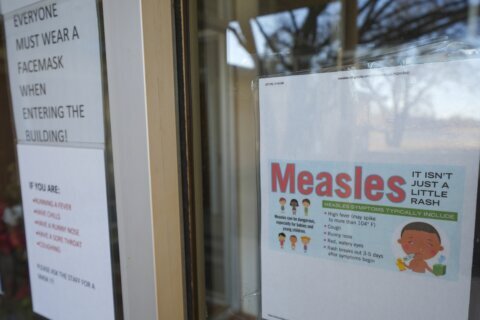This article was reprinted with permission from Virginia Mercury.
Eric Klotz, a combat-disabled U.S. Navy veteran with nearly two decades of service in special operations, was sitting at his home in Hardy, a quiet community near Smith Mountain Lake, when the phone rang. On the other end was Eric Mosley, a fellow veteran and Democratic organizer, asking Klotz if he would once again serve — this time by running for the 39th House of Delegates District.
A longtime Republican who switched parties when Donald Trump first assumed office in 2017, Klotz, 53, had watched the political landscape shift dramatically during the first few months of Trump’s second presidency. The erosion of the country’s foundational principles, especially after his years of military service, troubled him deeply.
“I did a lot of deployments overseas, and I have experience living in countries controlled by authoritarian governments. I witnessed the suppression of individual rights and liberties, something we used to believe was protected by the U.S. Constitution,” Klotz said in a phone interview. “I can’t stand idly by while that birthright is under attack here at home. I took an oath to defend the Constitution, and it’s not just for some, it’s for all.”
On Wednesday, Klotz filed the paperwork to run as a Democrat in a historically conservative seat, currently represented by Del. Will Davis, R-Franklin. Despite the district’s strong Republican leanings, Klotz’s military background and willingness to cross party lines to fight for the principles he believes in have made him a unique contender.
Klotz is among a growing number of veterans stepping up to run for office — as Democrats — in traditionally conservative districts. They hope that their stories and experience in military service will resonate with moderate Republicans and independents, especially amid growing concerns over Trump’s military leadership decisions, including recent firings of military leadership and the controversial national security leaks surrounding classified war plans.
“This is a very strong military area,” Klotz said of the 39th District. “People here take pride in their service, and that’s something I respect deeply. My military background allows me to relate to a lot of people, and it bridges across party lines.”
The push to field more candidates in conservative districts, particularly those with military backgrounds, is part of a broader strategy by several grassroots organizers to increase voter turnout in hopes of flipping key districts. At the same time, Democrats aim to bolster support for former U.S. Rep. Abigail Spanberger, a retired CIA officer who is expected to be the party’s gubernatorial nominee, and her bid to claim the governor’s office this November.
One of these organizers is Mosley, a retired naval aviator and Republican-turned-Democrat from Bedford County, who earlier this month received a call from Dr. Fergie Reid of the 90 for 90 Voter Registration Project, about finding a veteran willing to run in District 39. Without hesitation, Mosley thought of Klotz.
“I’ve seen an attack on democracy from Republicans, and that’s what pushed me to get involved. Eric Klotz is a proven leader with the courage to stand up for what’s right, regardless of fear,” Mosley said. “I believe veterans like Eric, who have devoted their lives to defending the Constitution, can speak to Republicans who may be disillusioned with the direction the current administration is taking.”
At least eight House Democrats are veterans
And while Klotz is focusing on District 39, he is not alone in his mission. Veterans are running for other conservative-leaning districts across the state.
In District 67, Mario Haggerty, a former U.S. Navy officer and veteran of overseas service in Europe and Japan, is one of two Democrats seeking the party’s nomination. Haggerty, who now manages defense projects and works with the Missile Defense Agency, is hoping to bring his expertise and perspective to the General Assembly.
Stacey Carroll, a National Guard non-commissioned officer with 19 years of service, is running in District 64. She will be facing Del. Paul Milde, R-Stafford, in November. Shane Boswell, a former Navy chief petty officer, is challenging Republican Del. Delores Oates, R-Warren, in District 31, which includes parts of Clarke, Frederick, and Warren Counties.
Meanwhile, in District 75, a once conservative district south of Richmond, U.S. Army combat veteran Steven Miller-Pitts is vying for the seat held by Republican Del. Carrie Coyner, R-Chesterfield. Additionally, U.S. Marine Corps veteran Jasmine Lipscomb is once again seeking the Democratic nomination in District 49, which includes Danville and parts of Halifax and Pittsylvania counties, hoping to build on her previous campaign.
At least eight Democratic veterans are already serving in the House of Delegates, including Speaker Don Scott, D-Portsmouth, a Navy vet who has served on the USS John Hancock, Del. Jackie Glass, D-Norfolk, also a Navy veteran, and Del. Dan Helmer, D-Fairfax, a West Point graduate with combat experience in Iraq and Afghanistan.
Others include Del. Michael Feggans, D-Virginia Beach, Del. Marty Martinez, D-Loudoun, Del. David Reid, D-Loudoun, Del. Marcus Simon, D-Fairfax, and Del. Josh Thomas, D-Prince William.
Helmer, who serves as the House Democrats campaigns chair, on Thursday took on a new role as co-chair of The Next Mission, a national recruitment committee for veterans. This effort, part of the New Politics organization, aims to support candidates from military service backgrounds and is backed by $20 million in funding. Helmer sees this initiative as critical, especially given the current state of the nation’s political landscape.
“This is a national phenomenon, not just a Virginia phenomenon,” Helmer said in a phone interview. “This effort comes at an unprecedented time of risk to our democracy. To have those who’ve sworn an oath to uphold and defend the Constitution step forward to serve again in a new way is essential right now.”
Helmer emphasized that veterans, having fought to protect democratic ideals, are uniquely positioned to lead during these turbulent times.
“Time and again, those who have stood up for democracy, served side by side with those willing to put their lives on the line for it, and sworn an oath to defend our constitution, are stunned by what we are seeing today. And many of them have stepped forward to serve again.”
Trump policies leave many veterans “terrified”
Herb Rubenstein, chairman of the Lex-Rock-BV Democratic Committee, a coalition of party committees from Lexington, Rockingham County, and Buena Vista, said efforts are underway to recruit veterans for political office at all levels, from Congress to local positions.
“We’re not just reacting; we’re rejecting the people who are bombastic and dangerous,” Rubenstein said, referencing current Republican leaders in Congress, including seven Navy SEALs.
He voiced concerns over the Trump administration’s handling of national security.
“Many veterans are terrified. This guy (Trump) is selling us out to adversaries, using unsecure encrypted systems to communicate, and he’s been doing it for a long time. The military has a lot at stake. We need adults in the room for political governance — especially when it comes to the civilian leadership of our military. Former military personnel represent those adults, and they bring a high level of integrity.”
Rubenstein pointed to the significant financial backing of VoteVets, a Democratic group supporting veterans in politics, which recently donated $500,000 to Spanberger’s gubernatorial campaign — the largest donation in the group’s 20-year history, according to the New York Times.
Rubenstein sees Spanberger as the type of candidate capable of leading the Democratic Party back to power in Virginia.
“We’ve got to activate our veterans, not just have them run for state office,” Rubenstein emphasized. “We need them on city councils, planning commissions, and economic development boards. That’s the evolution of this effort, and seeing veterans run in House districts is the result of years of hard work, particularly in the wake of a really destructive president.”
Reid, of the 90 for 90 Voter Registration Project, noted that the push to recruit military veterans as Democratic candidates in conservative districts is part of a broader strategy to increase Democratic turnout, not just flip seats. He emphasized the importance of offering voters a real choice, especially in areas traditionally dominated by Republicans.
“Given what’s going on in the national political world, it’s important for every Virginian to have a choice on the ballot,” Reid said. “Whether they want to vote for the Republican or the Democrat, that’s on them, but they should have the option to vote for either, especially when the party in control of the country right now is messing up so badly. There should be the option to send a message to the other party.”
Reid noted that in “super-Republican” districts, where Democrats often face significant challenges, some “remarkable” candidates are ready to take on the challenge.
“It’s really interesting who will step up in these districts, where people have a really good reason to be fearful to run if they’re a Democrat. So who do we see stepping up in these districts? We see women stepping up. We see Black people stepping up, and we see military people stepping up.”
Reid believes these candidates can play a critical role in not just flipping seats but also in bolstering Democratic chances up and down the ballot.
But David Richards, a political science professor at the University of Lynchburg, remains cautious about the potential impact of veterans running as Democratic candidates in deeply Republican districts, such as the 39th.
“I am hesitant to say that anything will help Democrats in a district like that, where more than two-thirds of the voters are Republicans,” Richards said. However, he acknowledged the strategic significance of candidates like Klotz, the special operations veteran.
Richards pointed to the success Democrats had with Eugene Vindman, a U.S. Army veteran, in the 7th Congressional District, though he noted that Vindman’s national profile made his candidacy an exceptional case.
“If we start to see more moderate, former military folks run, that could spell trouble for Republicans in Virginia,” Richards explained. He added that with Trump losing the state by less than 6%, Virginia’s political landscape is still competitive, particularly in local races.
While District 39 may seem like an unlikely battleground, Klotz is gearing up for a different kind of fight.
“I have been in combat, and I did this for our country, and it feels like it needs to be done here too,” he said. “This time, I will be fighting for the rights of all Virginians.”







